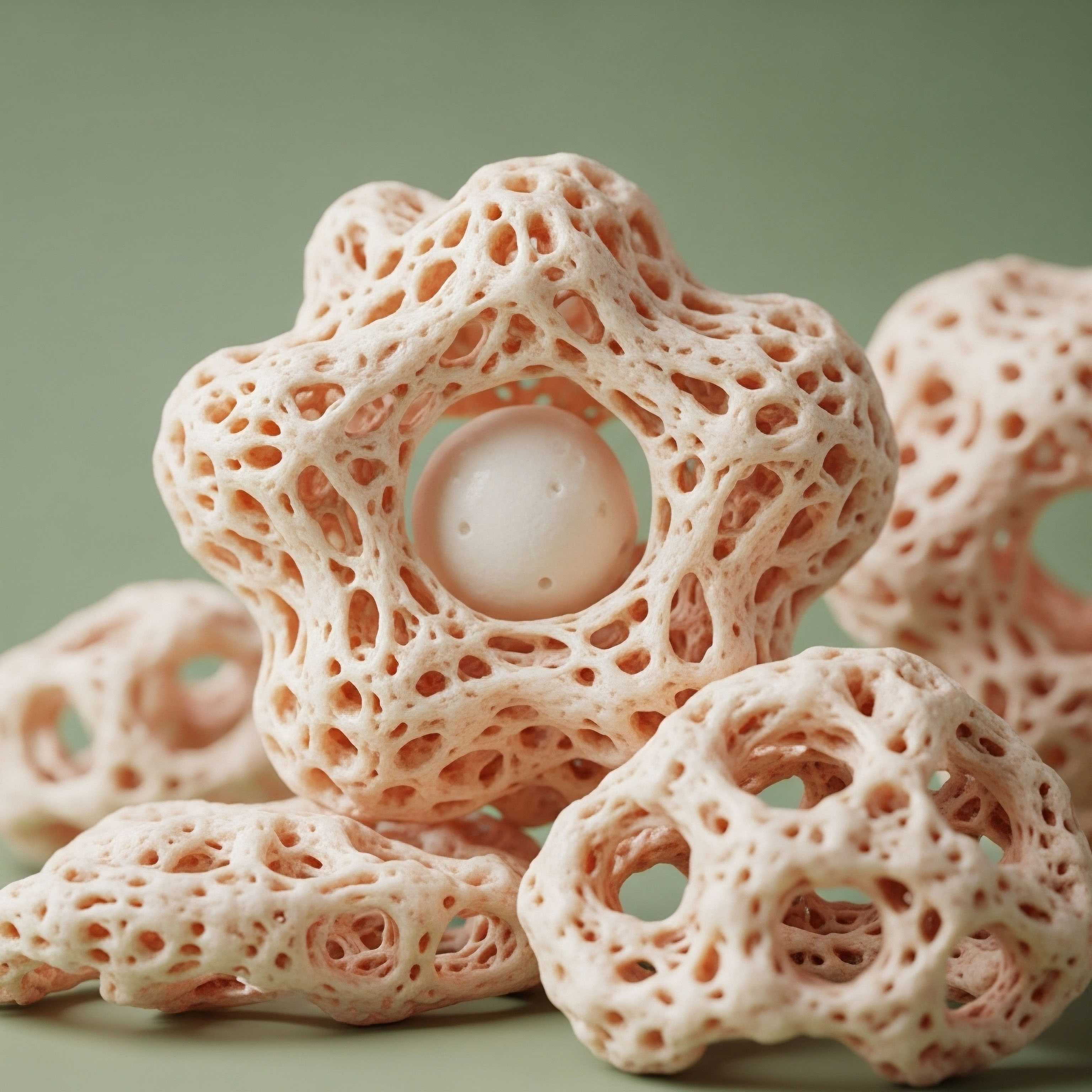

Fundamentals
Have you ever found yourself walking into a room, only to pause and wonder why you entered? Perhaps you misplace your keys more often, or struggle to recall a familiar name that rests just beyond your grasp. These moments, often dismissed as simple signs of aging, can stir a quiet unease.
They represent subtle shifts in cognitive function, signaling that the intricate internal machinery of your body might be operating with less than optimal efficiency. Many individuals experience these subtle changes, feeling a disconnect from their former mental acuity. This experience is not merely a matter of growing older; it often reflects deeper biological currents, particularly within the endocrine system, which profoundly influences brain health.
Your body operates as a complex network of interconnected systems, each communicating through chemical messengers. Among these, hormones serve as vital signaling molecules, orchestrating countless physiological processes. They regulate everything from your mood and energy levels to your sleep patterns and metabolic rate.
When these chemical signals become imbalanced, their widespread influence can extend to the brain, affecting clarity, memory, and overall mental performance. Understanding this fundamental connection between hormonal balance and cognitive vitality represents a powerful step toward reclaiming your sharpest self.
Hormonal balance profoundly influences cognitive vitality, acting as a key regulator of brain function and mental acuity.

The Endocrine System and Brain Function
The endocrine system, a collection of glands producing and secreting hormones, acts as the body’s internal communication network. These glands, including the thyroid, adrenal glands, and gonads, release hormones directly into the bloodstream, allowing them to travel to distant target cells and tissues.
Within the brain, specific receptors exist for various hormones, indicating their direct role in neuronal activity and brain health. For instance, sex hormones, such as estrogens and androgens, exert significant influence over brain regions associated with memory and learning.
As individuals age, the production of certain hormones naturally declines. This decline is not a uniform process; it varies significantly between individuals and can be influenced by lifestyle, genetics, and environmental factors. The gradual reduction in circulating hormone levels can impact neural plasticity, neurotransmitter synthesis, and cellular energy production within the brain. Recognizing these age-related hormonal shifts is a crucial first step in addressing cognitive concerns.

How Hormonal Shifts Affect Cognition
When hormonal levels deviate from their optimal ranges, a cascade of effects can unfold within the brain. For example, a reduction in specific sex hormones can alter the brain’s ability to form new connections, a process known as synaptic plasticity, which is essential for learning and memory. These changes can manifest as difficulties with recall, reduced processing speed, or a general sense of mental fogginess. The symptoms often experienced by individuals include:
- Memory Lapses ∞ Forgetting recent events or struggling with word recall.
- Reduced Mental Clarity ∞ Experiencing brain fog or difficulty concentrating.
- Slower Processing Speed ∞ Taking longer to grasp new information or solve problems.
- Mood Fluctuations ∞ Increased irritability, anxiety, or feelings of sadness.
- Decreased Motivation ∞ A general lack of drive or enthusiasm for daily activities.
These symptoms are not isolated incidents; they are often interconnected, reflecting a systemic imbalance. Addressing the underlying hormonal landscape offers a pathway to restoring not only cognitive function but also overall vitality and well-being. This approach acknowledges the individual’s experience, providing a framework for understanding the biological mechanisms at play.


Intermediate
Moving beyond the foundational understanding of hormonal influence, we consider the specific clinical protocols designed to recalibrate the endocrine system. Personalized hormonal interventions aim to restore physiological balance, thereby supporting optimal brain function and mitigating age-related cognitive shifts.
These interventions are not one-size-fits-all solutions; they are tailored to an individual’s unique biochemical profile, symptoms, and health objectives. The selection of specific agents and their administration methods depends on a comprehensive assessment of laboratory markers and clinical presentation.
Personalized hormonal interventions aim to restore physiological balance, supporting optimal brain function and mitigating age-related cognitive shifts.

Targeted Hormonal Optimization Protocols
Hormonal optimization protocols involve the careful administration of bioidentical hormones or peptides to address specific deficiencies or imbalances. These therapies work by replenishing declining hormone levels, allowing the body’s internal communication systems to operate more effectively. The goal is to restore youthful hormonal signaling, which can have far-reaching effects on cellular repair, metabolic efficiency, and neurological health.

Testosterone Replacement Therapy for Men
For men experiencing symptoms associated with declining testosterone levels, often referred to as andropause or hypogonadism, Testosterone Replacement Therapy (TRT) can be a transformative intervention. Symptoms such as diminished mental acuity, reduced libido, fatigue, and changes in body composition can signal a need for evaluation. A standard protocol often involves weekly intramuscular injections of Testosterone Cypionate (200mg/ml). This method provides a steady supply of the hormone, mimicking the body’s natural production rhythm.
To maintain the intricate balance of the endocrine system and preserve natural testicular function, additional medications are frequently integrated. Gonadorelin, administered via subcutaneous injections twice weekly, stimulates the body’s own production of luteinizing hormone (LH) and follicle-stimulating hormone (FSH), which are crucial for endogenous testosterone synthesis and fertility preservation.
To manage potential conversion of testosterone to estrogen, an oral tablet of Anastrozole is often prescribed twice weekly. This medication acts as an aromatase inhibitor, preventing excessive estrogen levels that can lead to undesirable side effects. In some cases, Enclomiphene may be included to further support LH and FSH levels, offering another layer of endocrine system support.

Testosterone and Progesterone Balance for Women
Women, too, experience significant hormonal shifts, particularly during peri-menopause and post-menopause, which can affect cognitive function. Symptoms like irregular cycles, mood changes, hot flashes, and reduced libido often accompany these transitions. Personalized protocols for women typically involve lower doses of testosterone compared to men, recognizing the physiological differences in hormonal requirements.
Testosterone Cypionate is commonly administered via subcutaneous injection, typically 10 ∞ 20 units (0.1 ∞ 0.2ml) weekly. This precise dosing helps to restore optimal androgen levels, which can positively influence mood, energy, and cognitive sharpness. Progesterone is prescribed based on an individual’s menopausal status and symptoms, playing a vital role in balancing estrogen and supporting neurological health.
For some women, Pellet Therapy offers a long-acting testosterone delivery method, where small pellets are inserted under the skin, providing a consistent release of the hormone. Anastrozole may be considered in specific instances where estrogen conversion needs to be managed.
The following table outlines common hormonal interventions for men and women:
| Hormone Therapy Type | Primary Hormone(s) | Typical Administration | Cognitive Relevance |
|---|---|---|---|
| Male Testosterone Optimization | Testosterone Cypionate | Weekly intramuscular injection | Supports mental acuity, processing speed, mood. |
| Female Hormonal Balance | Testosterone Cypionate, Progesterone | Weekly subcutaneous injection, oral | Aids memory, mood stability, mental clarity. |
| Growth Hormone Peptide Therapy | Sermorelin, Ipamorelin/CJC-1299 | Subcutaneous injection | Enhances memory, focus, sleep quality, neuroprotection. |

Growth Hormone Peptide Therapy
Beyond traditional hormone replacement, peptide therapies represent another frontier in personalized wellness, particularly for those seeking anti-aging benefits, improved body composition, and enhanced cognitive function. Growth hormone-releasing peptides (GHRPs) stimulate the body’s own pituitary gland to produce and release natural growth hormone (GH). This is distinct from administering exogenous GH, as it works with the body’s inherent regulatory mechanisms.
Key peptides in this category include Sermorelin and the combination of Ipamorelin / CJC-1295. These agents encourage the pulsatile release of GH, mimicking the body’s natural rhythm. Increased GH levels are associated with improved cellular repair, enhanced metabolic function, and significant benefits for brain health.
Individuals often report improvements in sleep quality, which is intrinsically linked to cognitive restoration, alongside enhanced concentration and mental acuity. Other peptides, such as Tesamorelin and Hexarelin, also stimulate GH release, while MK-677 acts as a growth hormone secretagogue, increasing GH and IGF-1 levels.
Additional targeted peptides address specific aspects of well-being that indirectly support cognitive health. PT-141, for instance, targets sexual health, which is often intertwined with overall vitality and mental state. Pentadeca Arginate (PDA) supports tissue repair, healing processes, and inflammation modulation, all of which contribute to systemic health and can indirectly impact brain function. These protocols represent a sophisticated approach to biochemical recalibration, moving beyond simple symptom management to address underlying physiological needs.


Academic
The intricate relationship between hormonal signaling and cognitive integrity extends to the deepest levels of cellular and molecular biology. Age-related cognitive decline is not a singular phenomenon; it arises from a confluence of factors, including oxidative stress, neuroinflammation, and altered neurotransmitter dynamics. Personalized hormonal interventions aim to address these underlying mechanisms by restoring the delicate balance of the endocrine system, thereby supporting neuronal resilience and synaptic function.
Personalized hormonal interventions address cellular and molecular mechanisms of cognitive decline by restoring endocrine balance.

Endocrine Axes and Neuroprotection
The central nervous system and the endocrine system are in constant dialogue, forming complex feedback loops that regulate physiological processes. The Hypothalamic-Pituitary-Gonadal (HPG) axis, for example, governs the production of sex hormones, which exert profound effects on brain structure and function. Gonadal steroids, such as estrogens and androgens, influence neuronal survival, dendritic arborization, and synaptic density in brain regions critical for memory, including the hippocampus and prefrontal cortex.
Estrogens, particularly 17β-estradiol, demonstrate neuroprotective properties through multiple pathways. They can reduce neuroinflammation by modulating microglial activity and cytokine production. Estrogens also act as antioxidants, mitigating oxidative damage to neuronal cells, a significant contributor to neurodegeneration. Furthermore, estrogens influence cholinergic and serotonergic systems, which are vital for attention, mood, and memory consolidation.
The timing of estrogen therapy initiation appears to be a critical factor, with studies suggesting a “window of opportunity” where early intervention in menopause may yield more favorable cognitive outcomes compared to late-life initiation.
Androgens, primarily testosterone, also play a direct role in brain health. Testosterone can enhance synaptic plasticity, increasing the number of new cells and the density of dendrites in the hippocampus. It contributes to neuroprotection by reducing oxidative stress through the activation of enzymes like superoxide dismutase (SOD) and glutathione peroxidase (GSH-Px).
Testosterone also influences the regulation of amyloid-beta (Aβ) deposition and tau hyperphosphorylation, pathological hallmarks observed in Alzheimer’s disease. The androgen receptor (AR) activation, independent of estrogen conversion, is a key mechanism through which testosterone exerts its neuroprotective effects.

Growth Hormone and Brain Remodeling
The Growth Hormone (GH) / Insulin-like Growth Factor-1 (IGF-1) axis represents another critical pathway for cognitive health. GH, secreted by the pituitary gland, and its downstream mediator IGF-1, influence neurogenesis, neuronal survival, and synaptic function. Age-related decline in GH levels is associated with impaired cognitive function, including deficits in memory and mental processing speed.
Peptides like Sermorelin and Ipamorelin / CJC-1295 stimulate the pulsatile release of endogenous GH, thereby supporting brain health. Increased GH and IGF-1 levels promote neurogenesis, the formation of new neurons, particularly in the hippocampus. They also enhance vasculogenesis, the formation of new blood vessels, which improves cerebral blood flow and nutrient delivery to brain tissue.
These peptides can reduce neuronal cell loss and promote the expression of presynaptic markers and myelin basic protein, indicating support for synaptic integrity and myelination, crucial for efficient neural communication.
The interplay of these hormonal systems extends to metabolic health and inflammation, both of which profoundly affect cognitive function. Hormonal imbalances can contribute to insulin resistance and systemic inflammation, creating an environment detrimental to neuronal health. By optimizing hormonal signaling, these interventions can indirectly improve metabolic parameters and reduce chronic inflammation, further supporting cognitive resilience.
The following table summarizes the neuroprotective mechanisms of key hormones and peptides:
| Hormone/Peptide | Key Neuroprotective Mechanisms | Brain Regions Affected |
|---|---|---|
| Estrogen | Reduces neuroinflammation, acts as antioxidant, modulates cholinergic/serotonergic systems. | Hippocampus, Prefrontal Cortex |
| Testosterone | Enhances synaptic plasticity, reduces oxidative stress, influences Aβ/tau pathology. | Hippocampus, Cortex |
| Growth Hormone / IGF-1 | Promotes neurogenesis, vasculogenesis, supports neuronal survival and myelination. | Hippocampus, Cerebellum, Hypothalamus, Cortex |
| Sermorelin / Ipamorelin | Stimulates endogenous GH release, leading to GH/IGF-1 benefits. | Pituitary, Hypothalamus, Hippocampus |

References
- Lethaby, A. (2008). Hormone replacement therapy for cognitive function in postmenopausal women. Cochrane Database of Systematic Reviews, (4).
- LeBlanc, E. S. et al. (2001). Hormone replacement therapy and cognition ∞ systematic review and meta-analysis. JAMA, 285(11), 1489-1499.
- Moffat, S. D. (2005). Effects of testosterone on cognitive and brain aging in elderly men. Annals of the New York Academy of Sciences, 1055(1), 193-208.
- Newhouse, A. & El-Chemali, Z. (2019). Neuroendocrine Disturbances in Neurodegenerative Disorders ∞ A Scoping Review. Psychosomatics, 60(2), 115-126.
- Scheepens, A. et al. (2018). Growth Hormone Improves Cognitive Function After Experimental Stroke. Stroke, 49(5), 1247-1255.
- Spampinato, S. F. et al. (2025). Testosterone and brain aging. MedCrave Online Journal of Gerontology & Geriatric Research, 10(1).
- Wang, J. et al. (2023). Systematic review and meta-analysis of the effects of menopause hormone therapy on cognition. Frontiers in Aging Neuroscience, 15, 1146876.
- Wyss-Coray, T. & Mucke, L. (2002). Inflammation in neurodegenerative disease ∞ a double-edged sword. Neuron, 35(3), 419-432.

Reflection
Considering your own biological systems and their intricate workings offers a powerful lens through which to view your health journey. The information presented here serves as a guide, providing insights into the profound connections between hormonal balance and cognitive vitality. This knowledge is not an endpoint; it marks the beginning of a deeper exploration into your unique physiology.
Each individual’s biochemical landscape is distinct, and a personalized path toward reclaiming vitality requires careful, informed guidance. Understanding the mechanisms by which hormones and peptides influence brain function empowers you to engage more fully in discussions about your well-being. This proactive stance, rooted in scientific understanding, allows for a truly tailored approach to supporting your cognitive health and overall function.



